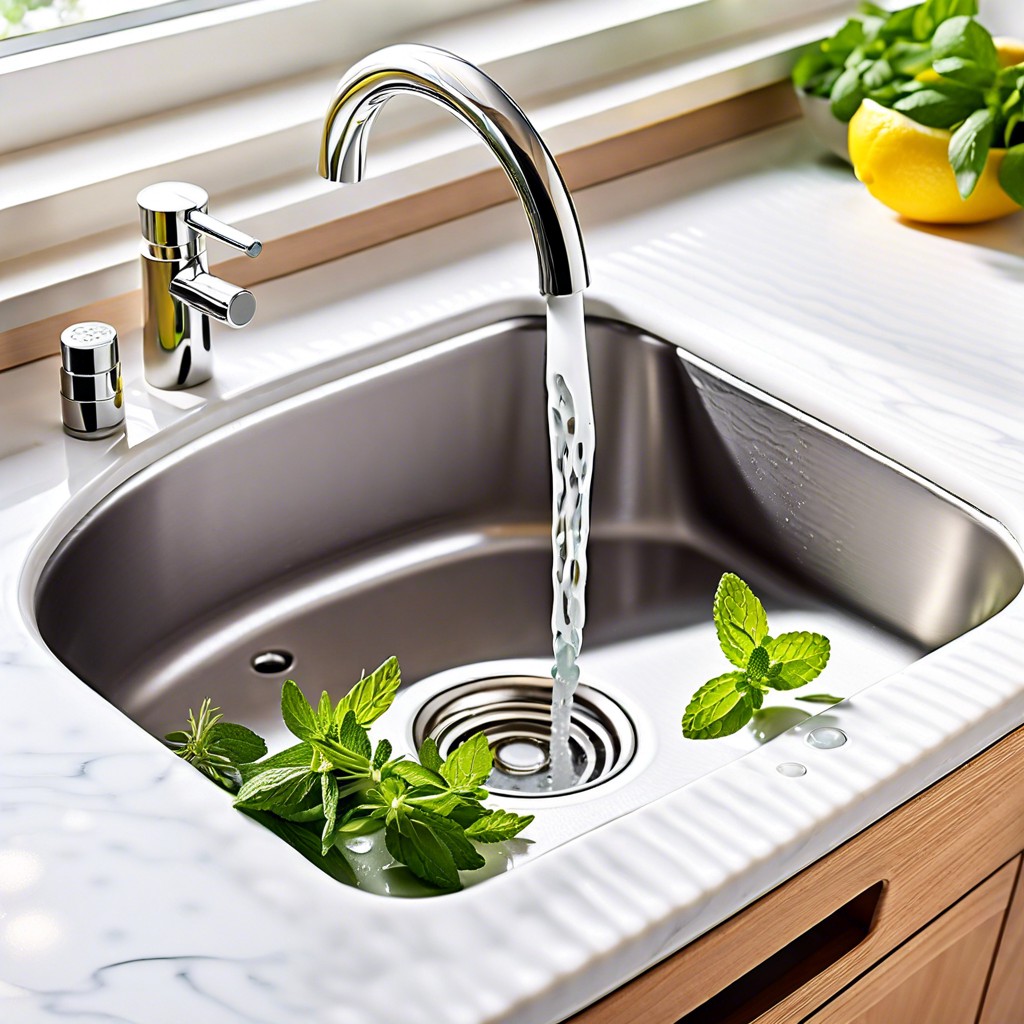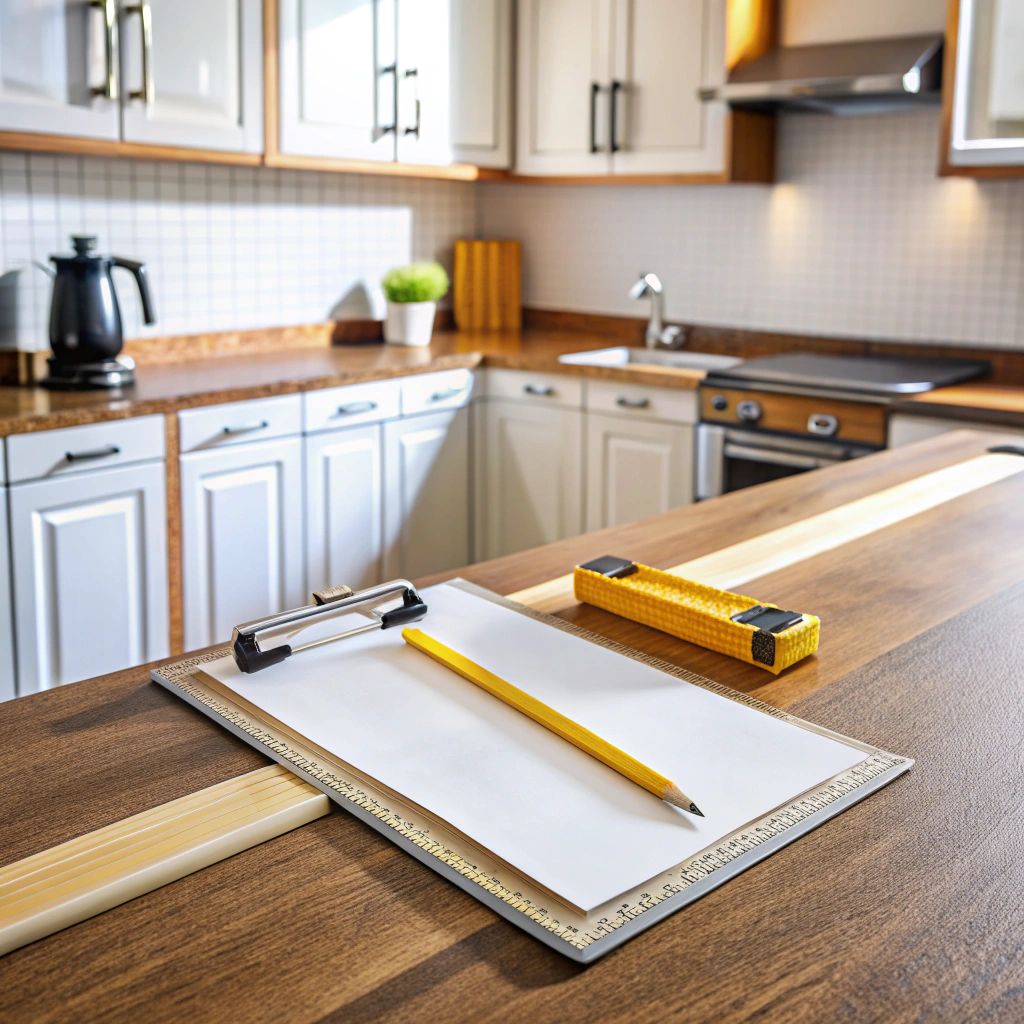Last updated on
Learn how to make your sink smell better with these easy and effective tips.
Got a smelly sink that’s turning your kitchen into an olfactory nightmare? Say no more! Whether it’s your garbage disposal or the drain, I’ve got the lowdown on how to make your sink smell fresher than a field of daisies. From quick DIY tricks like grinding citrus peels and using baking soda to professional tips, this guide has got it all.
Key takeaways:
- Clean drain stopper and flaps regularly.
- Use baking soda and vinegar for odor control.
- Grind citrus peels in the garbage disposal.
- Flush with boiling water once a week.
- Call a plumber for persistent smells.
What's Inside
Clean the Drain Stopper and Flaps

First, remove the drain stopper and any flaps present in your sink. These parts often catch all sorts of gunk and grime.
Rinse the stopper and flaps under hot water. If they’re particularly grimy, use a toothbrush and some dish soap to scrub away the buildup. You’d be surprised how much crud can accumulate there!
Once clean, put them back in place. This simple step can significantly reduce odors and improve your sink’s overall smell. A cleaner sink is a happier sink!
Flush With Hot Water
Hot water is a simple yet effective way to help clear any minor clogs and freshen up your sink. Just boil a kettle or pot of water, and slowly pour it down the drain.
The heat helps dissolve any greasy buildup that might be causing the stink. It’s like giving your sink a nice, warm bath.
If you have a double sink, don’t forget to treat both sides. Remember, slow and steady wins the race here. Pouring too fast can splash boiling water back at you. No one wants dinner prep interrupted by an impromptu trip to the ER.
Also, avoid this trick if you have PVC pipes. The intense heat can warp or damage these plastic pipes, and calling a plumber isn’t anyone’s idea of a good time.
Use Baking Soda and Vinegar
This dynamic duo isn’t just for science fair volcanoes. Baking soda and vinegar pack a powerful, deodorizing punch for your sink.
Start by pouring about half a cup of baking soda down the drain. Follow with one cup of vinegar. Bracing for the fizz? It’s like a mini, non-explosive eruption.
Leave the bubbly mixture to work its magic for 15 minutes. It will eat away at smelly residue and gunk.
Afterward, flush the drain with hot water. Not just a trickle—go full throttle here.
Repeat weekly for a fresh-smelling sink that even your grandma would be proud of.
Grind Citrus Peels
Citrus peels are like the superheroes of the kitchen. They can save the day, and your nose!
First, gather those lemon, lime, or orange peels left over from your last snack. Next, drop them into the garbage disposal. Not all at once, though – give them a fighting chance.
Turn on the cold water and fire up the garbage disposal. The peels will fight off those foul odors and leave behind a refreshing citrus aroma.
Bonus tip: the natural oils from the peel also help clean the blades, keeping them sharp and rust-free. Who knew snack leftovers could moonlight as natural cleaners? If only they could do the dishes too!
Flush With Boiling Water
Boiling water is a powerhouse when it comes to tackling smelly sinks. Here’s how it works:
Hot water helps dislodge any gunk or grime stuck in the pipes. This reduces the chance of bacteria buildup, which is often the cause of bad smells.
Pour boiling water down the drain slowly. This ensures it has time to coat the sides of the pipes and do its magic.
Be careful while handling boiling water. Safety first! Use a kettle or a pot with a spout to control the pour.
Do this once a week. Regular maintenance keeps your sink smelling fresh.
As an added tip, make this part of your routine after using the sink heavily, like after a big meal prep. It’s a small step that makes a big difference.
Use Ice Cubes and Salt
Got some ice cubes handy? Great! Here’s a cool trick (pun intended) that works wonders.
- Toss a handful of ice cubes down the sink.
- Add a couple of tablespoons of coarse salt. Table salt works too if that’s all you have.
- Run the cold water and turn on the garbage disposal.
The ice helps to dislodge any gunk clinging to the blades while the salt acts as a bit of an abrasive scrub. Together, they’re like the dynamic duo of sink cleaning. This method will not just make your sink smell fresher but also keep your disposal blades nice and sharp. Ice-cold perfection!
Use Commercial Drain Cleaner
Alright, we’ve tackled a lot of natural solutions, and sometimes you just need to bring out the big guns.
- Choose a drain cleaner specifically designed for kitchen drains. Look for ones that can break down grease and food particles.
- Follow the instructions on the label closely. Ventilate the area well. No one enjoys a kitchen that smells like a chemical lab.
- Pour the recommended amount down the drain. But don’t overdo it, or you might end up with a chemical volcano!
- Wait for the specified time. Use this time to enjoy a coffee or send some texts—anything but staring at the sink.
- Flush the drain again with hot water to remove any residue.
Using a commercial drain cleaner can be effective when natural solutions just aren’t cutting it. Just remember to handle these products with care, and your sink will smell like roses—or at least it won’t smell like last night’s fish tacos!
Flush With Bleach
Bleach to the rescue! It’s like the superhero for your sink’s bad odors. Here’s how to deploy it effectively.
First, make sure the sink is empty—no dishes, no distractions. Pour about half a cup of bleach down the drain. Follow up with cold water to wash it through the pipes. This helps the bleach reach all those sneaky corners where odors like to hide.
You might want to leave the bleach to sit for about 10 minutes before you rinse it fully. This allows it to tackle the bacteria causing the stench.
Remember, bleach is powerful, so open a window or turn on the ventilation fan to keep the air fresh while you work.
With these steps, you’ll have a sink that smells as if roses are its middle name—or at least not like last night’s fish dinner.
Clean the Garbage Disposal
First, cut off the power to avoid any ninja-finger incidents. Safety first, people!
Next, throw on some gloves and manually remove any visible gunk around the blades. Look, it’s not glamorous, but think of it as a mini treasure hunt—only the treasure is less… shiny.
Now, toss in some ice cubes and a handful of coarse salt. Run the disposal for about a minute. The ice sharpens the blades while the salt acts like an exfoliant, scrubbing away stuck-on grime.
Feel fancy? Follow up with citrus peels. Lemon and orange peels work wonders. They not only clean but also leave a pleasant scent. Plus, you’ll feel like you’re at a spa—sort of.
Finally, flush everything down with hot water to make sure no debris is left behind. Easy peasy!
Call a Professional Plumber
Sometimes, despite all efforts, the sink refuses to stop smelling like a forgotten science experiment. That’s when it’s time to bring in the pros.
Plumbers have specialized tools and expertise. They can identify issues hidden deep within the pipes. You’d be surprised what lurks down there.
A professional plumber can perform a deep clean that goes beyond DIY remedies, ensuring a thorough fix. Plus, they can diagnose if there’s a bigger problem, like a clogging issue or a broken pipe.
Involving a plumber prevents future problems from becoming catastrophic headaches. Think of it as a preventative measure; a little cost now can save a lot later.
So if your sink is still smelly, give your local plumber a call. You’ll thank yourself the next time you’re chopping garlic without a nose plug.




